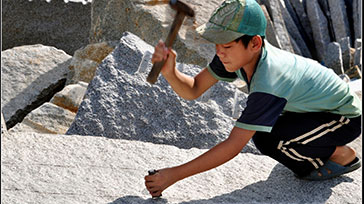World Day against Child Labour
Fighting Child Labour with quality education
Statement by Mr. Guy Ryder, Director-General International Labour Organization on the occasion of World Day against Child Labour

Making this link is key to developing effective strategies that can break the cycle of poverty which is a key factor, if not the sole factor, in producing child labour.
As things stand, the aspirations of many parents for their children and of children themselves for a decent education will remain unfulfilled dreams. Many girls and boys have no chance to attend school. Some try to combine school and work, but all too often must drop out of school well before reaching the legal age of employment and become child labourers.
The situation today is further aggravated by the impact of conflicts and crises. In conflict zones, students and sometimes their teachers have been the victims of violent attacks and kidnapping. Reports of schools being destroyed are not uncommon. The infrastructure of stability and prosperity is being undermined. In a range of circumstances families are fleeing physical and economic insecurity, crossing borders and hoping for a better life. Children make up a large share of these migration flows, at times travelling without their parents. Such journeys are frequently paths to child labour and exploitation.
Without adequate education, former child labourers are more likely than others to end up in poorly paid and insecure work as adults or to be unemployed. And there is a high probability that they will live in poverty and that their children will share the same fate.
A collective challenge and responsibility is to enable all children, girls and boys, to have access to education, quality education. Second-class education perpetuates second-class citizens. We all know that a solid education and good teachers can make a world of difference to the lives and futures of children and young people.
In 2014, the Nobel Peace Prize, awarded jointly to Kailash Satyarthi and Malala Yousafzai powerfully symbolized the close connection between the right to freedom from child labour and the right of all girls and boys to education. Their courage, their persistence and their vision should inspire us all to step up our action.
Ultimately, a future without child labour calls for inclusive development policies integrating decent work for adults, social protection floors and sound education systems. With political will and determination at all levels of development, priorities can be set, policy choices can be made and integrated action can be taken. A key challenge for the post-2015 development agenda and for action at global, regional and national levels is to secure sustainable and significant change.
The International Labour Organization and its government, employer and worker constituents have been in the forefront of the fight against child labour for nearly a century. We remain committed to working nationally, internationally and with the multilateral system to ensure children’s right to education and freedom from child labour as well as its corollary, the dignity of decent work for adults.